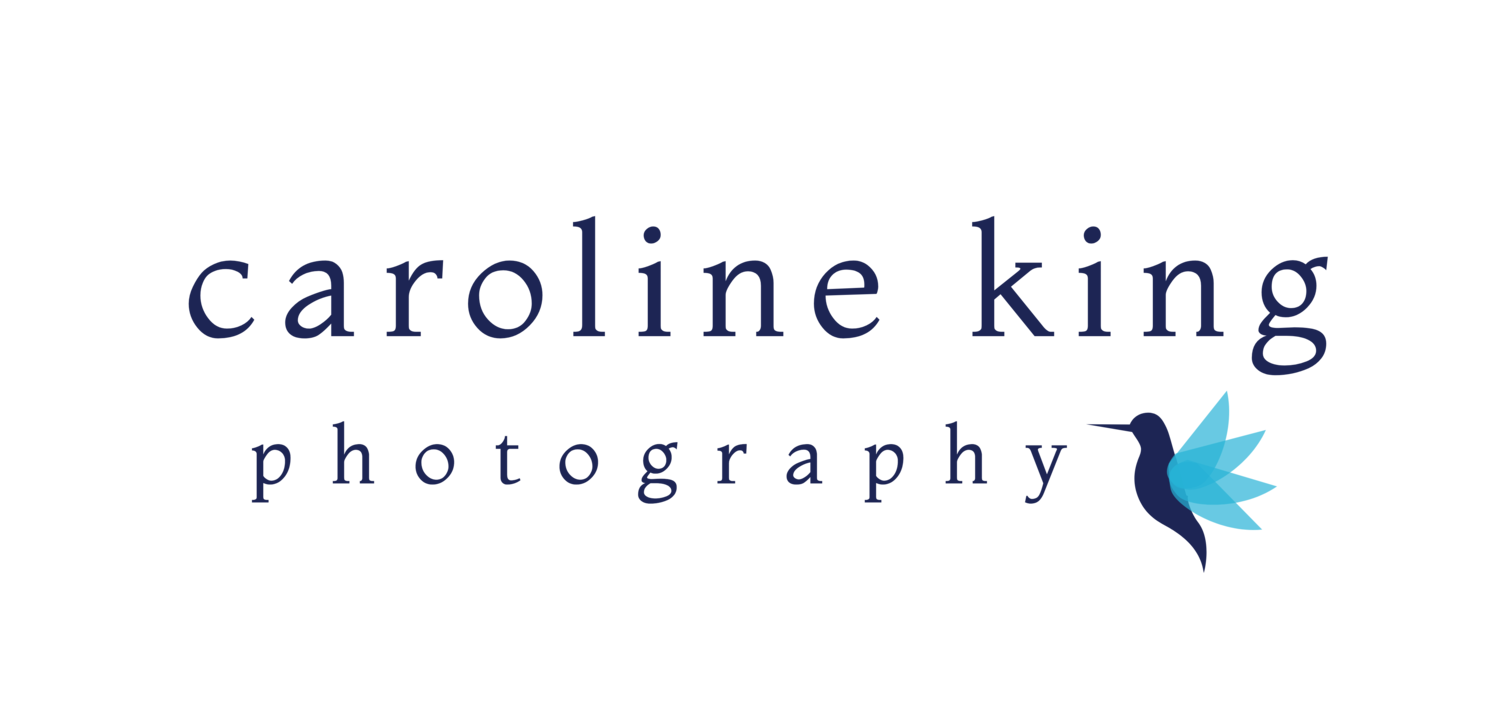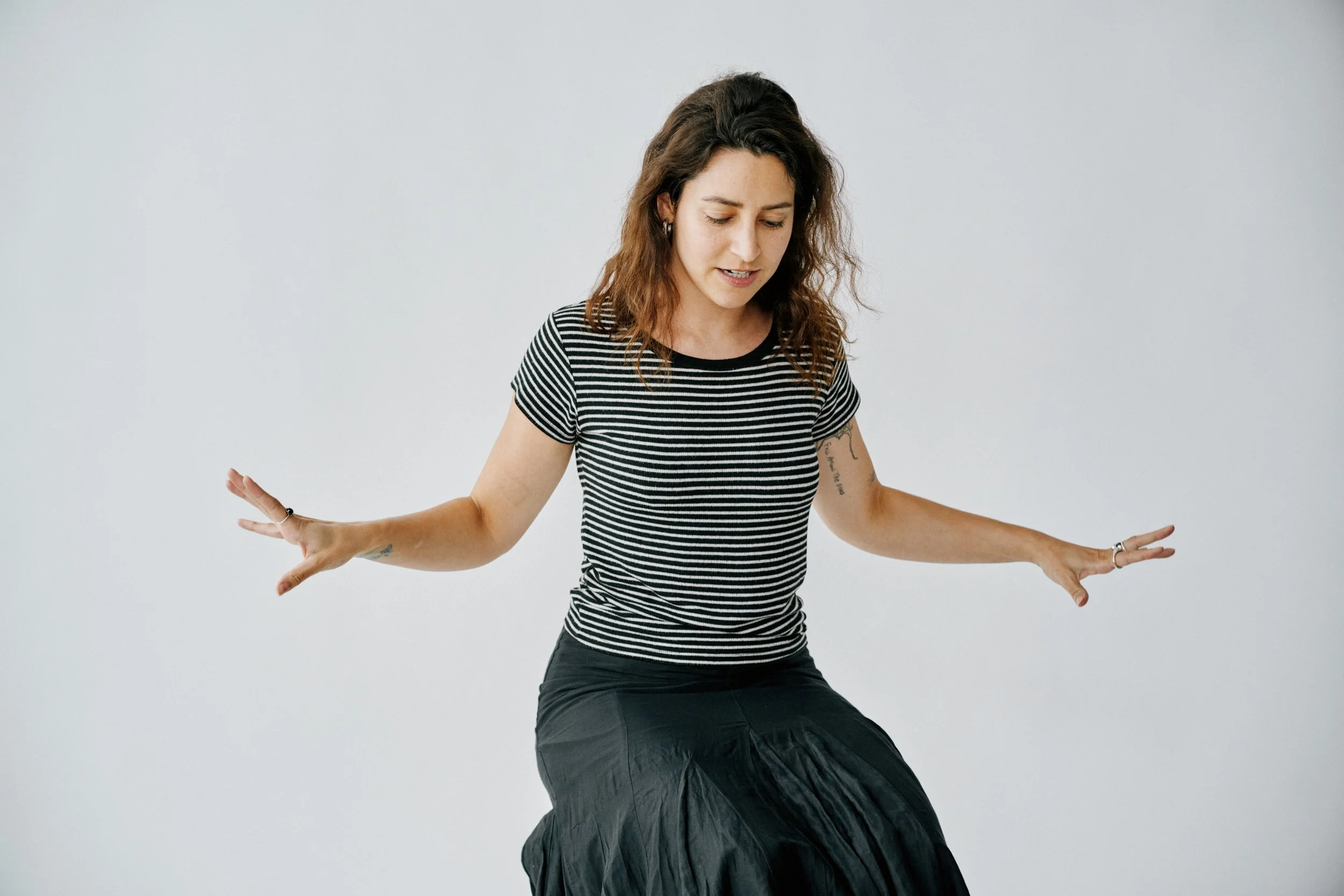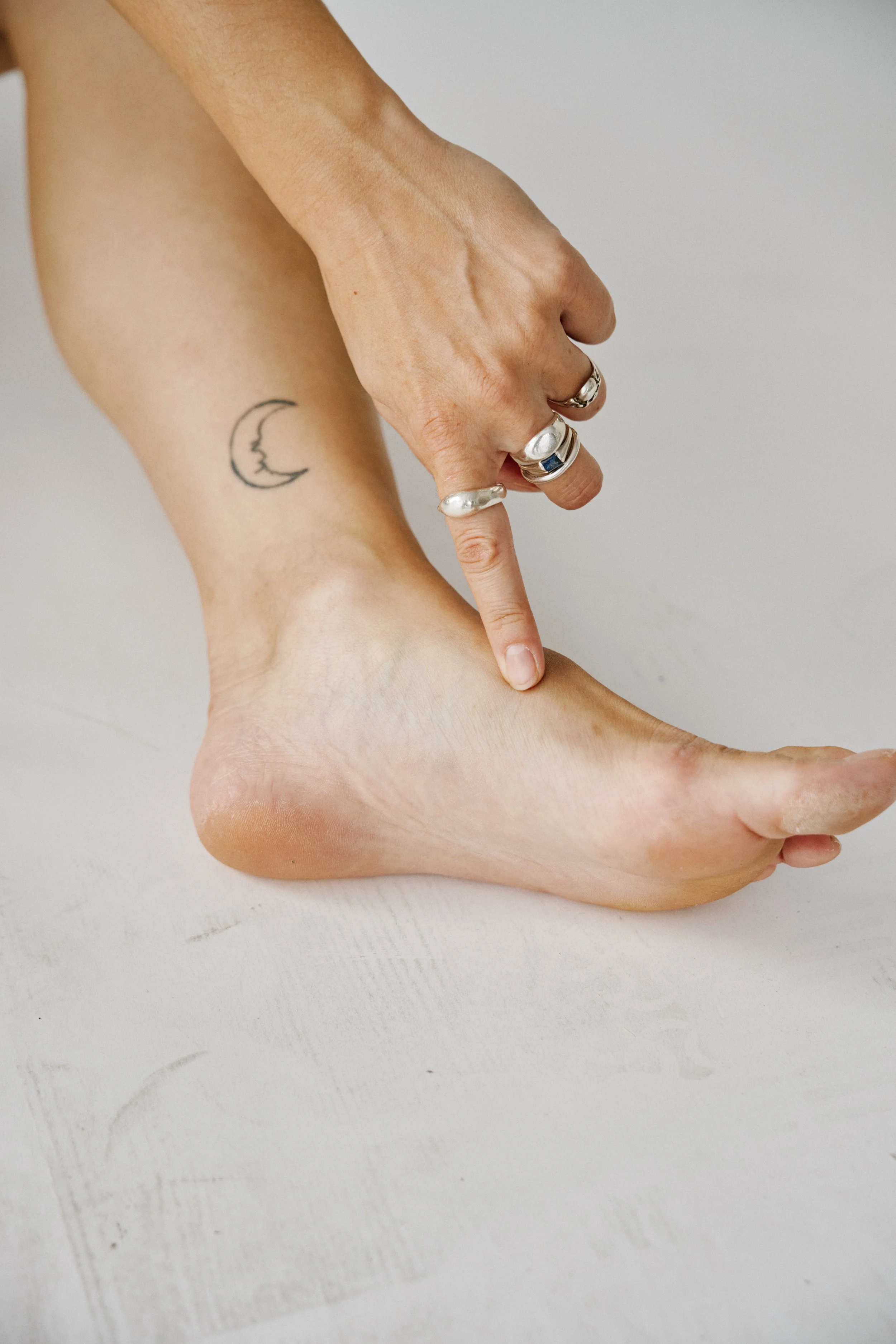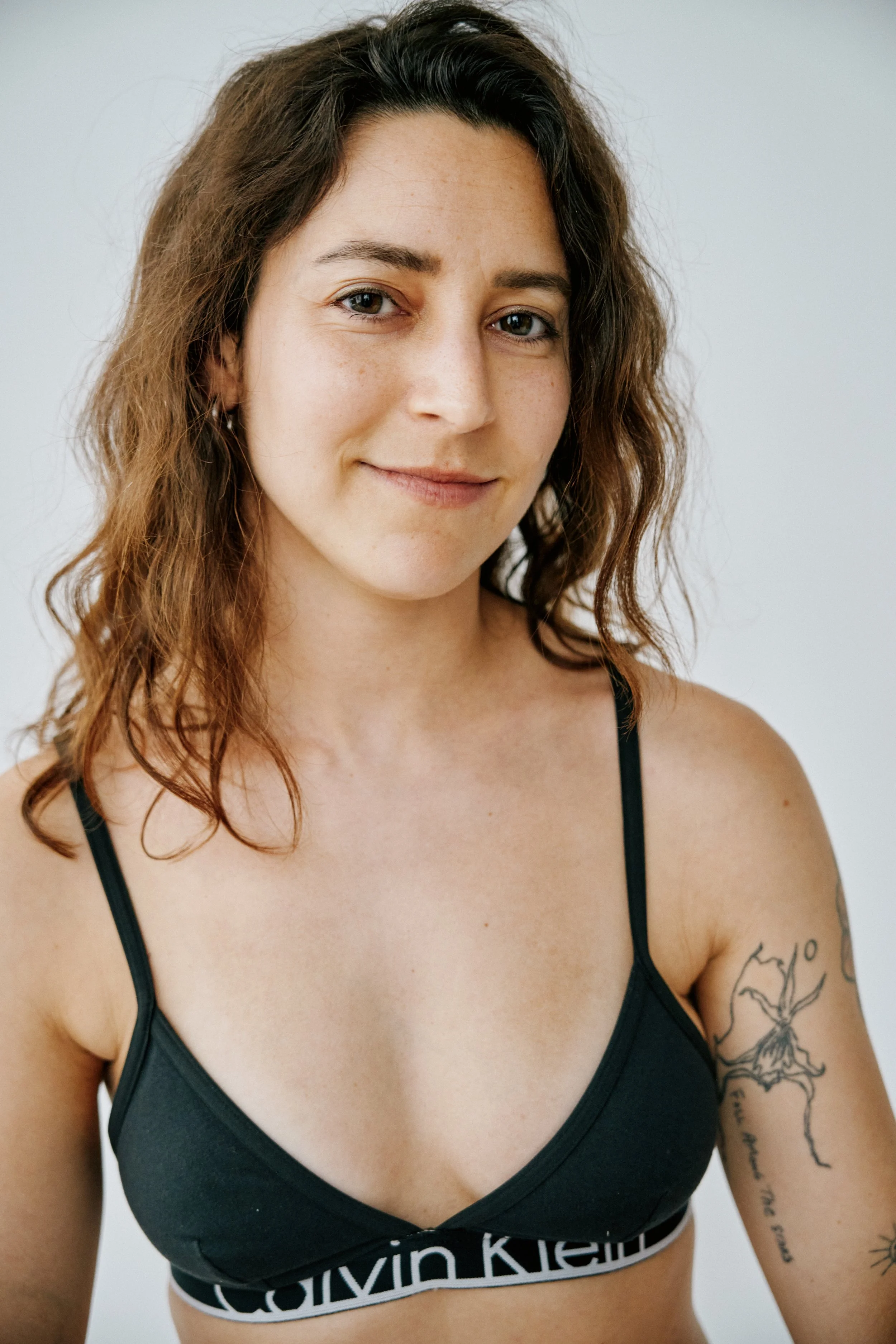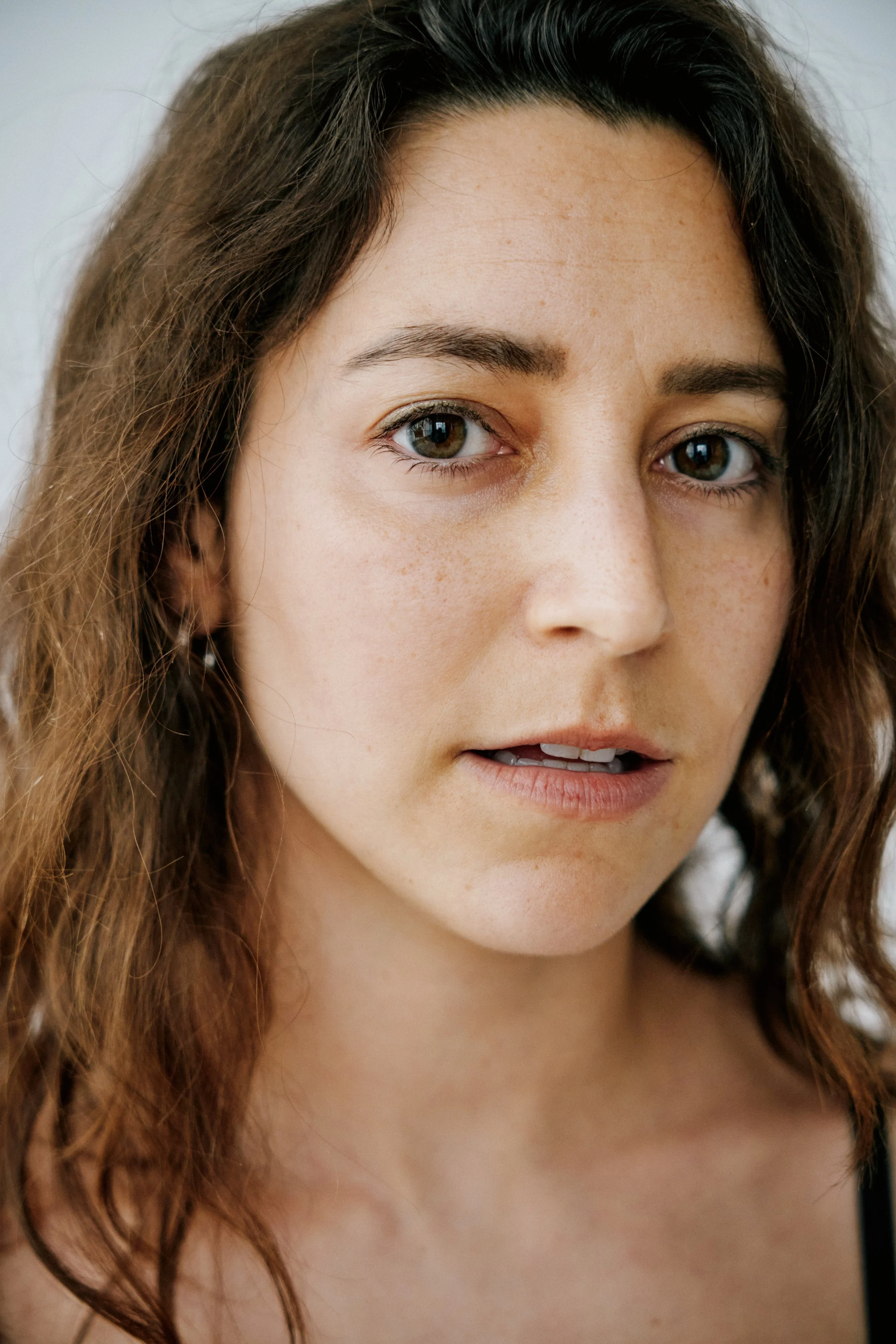Leona (they/them)
Instinctually I feel my body doesn't have any gender.
Then I think, the cat's out of the bag on the impact of the construct and so my expression of gender is necessarily shaped by my experiences, social influences, the activities I'm drawn to, my interaction with and the feeling of my clothes. Every so often I catch some mannerisms I either inherited or subconsciously observed and copied from my Dad — I rest my chin in my three middle fingers and my pinky bisects my lips in thought. I notice I’ve tucked a hand under my armpit for comfort and remember him.
When I go and I look at what's native in myself with respect to gender, I feel agender. There's no information. I like soccer and Rocky Horror. And all of these things now come with their set of assumptions. But they don't feel gendered to me. They just, they feel emotional or they feel textured. Like I wanted to run, run, run, run and I wanted to kick things as hard as humanly possible. My dream gender, or at least definitely a gender that makes me feel something, is Dr. Frankenfurter from Rocky Horror. Even setting aside how hot Tim Curry is (which we can’t), it’s the sexiness of curly tendrils and lingerie with a leather jacket that's all pinned up. Like sparkles and glitter and scrapes and bruises.
When I'm catcalled or misgendered, I definitely experience a discomfort that's physical. Flattened. Smaller. The words female and male really bother me. They feel clinical, boring, scientific. Needlessly scientific. If you try to regard it in terms of physical form, it doesn't add up. If you try to think of it in terms of chromosomes, it doesn't add up. If you try to think of it in terms of genitalia, it doesn't add up. It just starts to fall apart. Nobody is one thing, and so these categories don't fit anybody. They’re so restrictive, even to people who don't experience gender dysphoria. Like, you will sometimes say like, “I don't want to encounter a man. I don't want to see a man.” And I'm like, there's no such thing. So like, don't worry, honey! There are none.
Exploring my gender identity looks like stripping things away, unearthing, carrying less, shedding assumptions and expectations that I don't believe are innate.
I'm hoping that this is a stage that will lead to creating, generating, an expansion of me. In practice this can be as material as styling an outfit I've seen on the runway or out in the world using only the contents of my closet. It can be as abstract as embracing neutrality, a stance of non-judgment that makes me feel close to truth. Cultivating curiosity instead. It sounds kooky, it sounds Buddhist, but I do deep down feel like most things are a distraction from the fact that we, every single living being, are all one entity anyway, different shards of stardust that got fractured on Earth. Maybe what I'm talking about is as simple as the truth of our common humanity, or maybe I'm misquoting David Bowie.
I have some guilt though, like I just get to play and some people experience genuine gender dysphoria that is painful. And no, I didn't experience that. I felt more like, there is so much more possibility. Maybe it's the the guilt of the passing. Of being like, me and Harry Styles, we just get to fucking play, and what is at stake?
Non-binary, genderfluid, agender, any type of GNC people, do not owe anyone androgyny. I think that there is enormous privilege I bring to this, but it also feels really important to be like, yes, even me. Yes, in my dress, in my skirt, wearing makeup with my hair long, wearing wearing jewelry. Yeah, even me as I am. Non binary.
Gender is completely made up. In fact many things we think of as inevitable and objectively true are. As for gender: biologists, genealogists, endocrinologists, neurobiologists — everyone you want to cart this off to — will tell you that there are so many genders, so many expressions, so many beautiful inconsistencies across hormones, chromosomes or gametes, genitalia. And that's because it's of our own making, love! It's yours to define! You don't have to think about it as deeply as we have here, but you don't have to fear thinking about it. Sure, it may bring up some really unsettling questions or contradictions, but you can sit with those. I promise.
For people who are disabled or have chronic illnesses, our bodies aren't always an easy place to be in.
And so there's kind of that that sense of like, wishing it was different, wishing you could change things about yourself. It almost gives you permission to be like well, if I can go in and take tumors out, can I also go in and reshape my nose and can I, you know, shave down my stomach so I feel more confident? Can I go in and microblade my eyebrows? You know, it becomes endless and then you start to be like what if I could just… be without my body. It just feels like the same exact conversation as gender, like if I could just be without it, then I could really know what's here.
I have a tendency to stress eat. There's simply a point by which I can no longer taste or experience my food. It could be near the end of a normal meal, where I'm finishing everyone's plate. I don't think I'm still hungry, there's just some part of me that can't accept food waste, the knowledge of throwing out food. I suppress my restlessness or anxiety or feelings of powerlessness or shame or guilt, literally pushing it down with food in this totally disembodied act. I imagine it's an attempt to drown out the sensations of my body, or distract from the discomfort. During I feel absolutely numb, nothingness, a void (which is probably why I do it), but after I feel completely wrong in my body. Whatever's in my stomach distends just below the adrenalectomy scars, and I carry some alien pregnancy of my own feelings and materialize the feeling of disconnection.
Living with a chronic illness has been my journey to not see my body as a burden. Taking your meds, calling insurances, calling different specialists, getting them to talk to each other, getting them to send the authorization, get you like all this boring fucking extra shit that feels put on me, even though it's just my body. I've been trained to the point that when I have a headache, I write it down. Or I tell somebody. And I try to describe it like, what's the type of it? Is it dull? Is it behind the ears? Is it sharp? Is does it have an ocular component? You have to catalog, and that cataloguing pervades everything in my life. I find it really hard to like, let go of like pieces of paper, piece of things. I find it really hard to let go of anything because it's like, well, anything could be a clue that something isn’t right. Anything could be your body speaking to you. It's like this constant investigation that can be really exhausting.
And that feels also like trying to find what gender is actually. You know, where do I begin and end? Where am I?
My relationship to my body has been tumultuous, and I've internalized and embodied its extremes.
I had my first tumor at 7 years old. I think I put up a major block or boundary with my body after that incredibly destabilizing experience. I couldn't make sense of it and I didn't try to. Maybe I felt betrayed by my body, and I found it hard to connect with my peers when I returned from the hospital. I didn't talk about it, tried not to think about it, and disconnected from some of my senses, prioritizing thinking over feeling and intellectualizing feelings. But I always craved activity: gymnastics, lava tag, handball, soccer, skiing, biking, theater when I was growing up; then running, physical theater, aerial silks in college; after which I had a "fitness" phase where my entire schedule revolved around exercise. This lasted right up until my second tumor. I don't think I could sense or admit how tired my body was then; I wanted so desperately to prove I could do anything and establish an energetic capacity that I feared might soon be removed along with my second adrenal gland. I couldn't grasp how much I needed rest, and still struggle with how to slow down and sit with the reality of not being invincible, not being able to do all I want to do. Now I'm working on protecting my energy and meeting my needs around rest. I'm repairing my relationship to my body, bringing the extremes closer to one another.
I think my body has spoken: it will not tolerate abandonment and self-betrayal. It needs more or different care than the scans, labs, and prescriptions of Western medicine. I think it's saying, listen to me. I will tell you if you are quiet enough. At this time in my life, I am trying to listen. I am tuning in. Sometimes I get aches or pains or memories that remind me why I tuned out for so long. Sometimes there's radio silence, and this is where I have to retrain myself to stay with it, to keep listening to the static and see if something else will present itself. It's really hard work to resist intellectualizing or telling a story — as I am wont to do, meandering as it may be — and to instead attend to whatever is there, to offer curiosity and patience. Is this the writer in me reaching for a security blanket of words? Is this the New Yorker who is programmed for urgency and expediency? Or the person who has lived with a chronic illness, one genetically inherited, who has feared the difficulties that will attend aging? But I am committing and recommitting every day to tuning into myself. The reward of tuning in is presence, and noticing you're alive.
